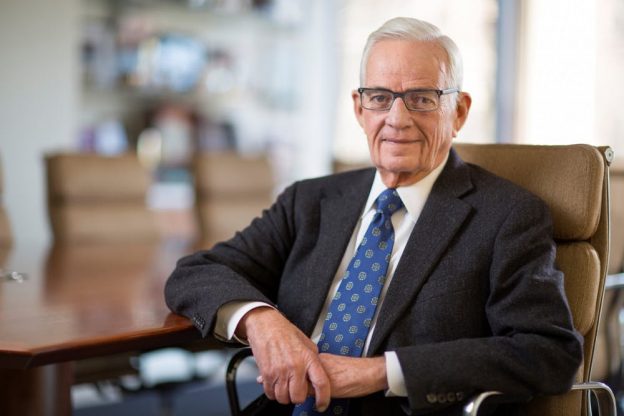Dismissed Treasury Secretary Paul O’Neill presented some strange contradictions, not least of which was his opposition to a tax cut. Tax cuts, especially for those from whom the most money is filched, are morally imperative and economically efficient. At the same time, O’Neill supported tax reform, denouncing the U.S. income tax code as “9,500 pages of gibberish.”
His favoring of a flatter and lower tax while simultaneously shunning tax cuts made sense once O’Neill’s concerns about the deficit became known. Less explicable was the cavorting with Bono. U2’s front man was another of O’Neill’s bad habits, although, in his defense, it was the only bit of global outreach O’Neill seemed to endorse. His affinity for Bono and his opposition to tax cuts got O’Neill praise from a lot of dullards. He must, however, be appreciated for more often than not infuriating the very same people.
The American public O’Neill enraged. The masses wanted a meddler and the Republicans wanted to use the politically appealing pleas the people made as the quid pro quo for more government intervention in the economy. O’Neill refused, quite admirably, to show the required leadership—with his optimistic laissez faire, he often thwarted the political agenda.
Cultivating the kind of bedside manner ordinary Americans demanded was not for him. O’Neill was especially tough during the days the pampered employees of Enron held marathons on “Donahue,” demanding that you and I—who have never and probably will never see the kind of funds these so-called victims were once in possession of—bail them out. “Companies come and go,” was O’Neill’s quip, “it’s part of the genius of capitalism.”
On personal responsibility, O’Neill was unwavering: “People get to make good decisions or bad decisions, and they get to pay the consequences or to enjoy the fruits of their decisions.” No American should be made to compensate people who knowingly signed a contract and who chose to sink all their savings into the once-great company. O’Neill’s refusal to be an “inspirational leadership” (read: nanny) was, if anything, rather inspiring.
With the truths that kept tumbling out of his mouth, the refreshingly impolitic and plainspoken O’Neill certainly infuriated the right people. He dared, for one, to speculate on the costs of waging war on Iraq. And so he should’ve. War is as good for the economy as is burning down a neighborhood to create jobs for construction workers.
Blunt about the bandidos of Latin America, O’Neill expressed hope that policies be implemented to ensure that foreign aid destined for Brazil, in this instance, does some good over and above padding a Swiss bank account. On the heels of his statement, the Brazilian Mickey Mouse money lost more than five percent of its value. Washington blamed O’Neill, although it’s the very least we should be able to expect an official to say about money mulcted from us, the taxpayers. If a currency plummets when the truth is spoken, too bad. If it takes lies to keep a currency buoyed, then the sooner truth intervenes with a correction, the better.
Or as O’Neill put it: “There is a real doubt about the effectiveness of interventions or words about intervention. It is not possible any more to actually fool the markets for very long.” Something Greenspan and his congressional backers should take to heart. They can drop interest rates to zero and make borrowing hazardously cheap, but they cannot sustain the bluff behind this credit expansion. Increasing the quantity of easy money has only decreased its purchasing power, a reality no amount of talking or tinkering can change.
To expect O’Neill or any politician to be honest about what’s going on with the legal—but illegitimate—tender would be naive. Tiny consolation that it is, O’Neill did dare to speak favorably about the safety of nuclear power plants. In light of the energy crises exacerbated by a moratorium on building such plants—courtesy of the environmental nuts—O’Neill’s veracity was overdue. Thanks to mass hysteria and Jane Fonda, people still believe that Three Mile Island was a disaster. But as the truism goes, “More people died in the back seat of Ted Kennedy’s car at Chappaquiddick than died as a result of that accident.” (One person—Mary Jo Kopechne—died as a result of Kennedy’s criminal negligence.)
Easily the most powerful factor in the O’Neill sacking is the election in 2004. The president is in campaign mode. With an unemployment rate of six percent, and climbing, Bush can’t tolerate a cabinet member who ventured that many welfare programs are bonanzas for bureaucrats. Not if he wants to peddle welfare largess for votes.
Granted, O’Neill was recalcitrant on the administration’s stimulus package. But so is Stephen Friedman, who will replace the sacked Larry Lindsey on the president’s National Economic Council. Since the newly hired Friedman also opposes tax cuts, it is not unreasonable to conclude that O’Neill’s objection to tax cuts was not the main reason he was required to fall on his sword.
©By ILANA MERCER
WorldNetDaily.com
December 11, 2002
CATEGORIES: Bush, Capitalism, Economy, Energy, Free Markets, Iraq, Politics & Policy, Taxation

 print
print